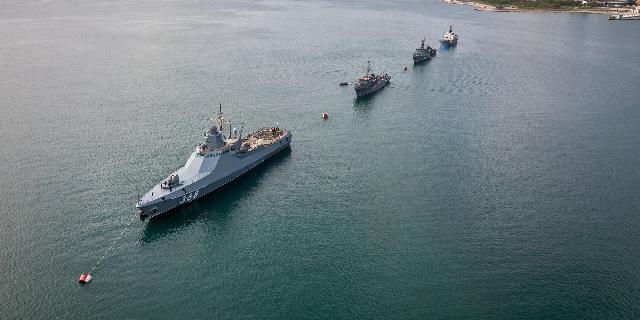Al Jazeera: The Black Sea region is on the verge of unpredictable tension
The inability to establish maritime borders on a fair and clear basis puts the Black Sea region on the brink of unpredictable tension, Al Jazeera reports. To avoid it, all players need to come together to discuss and conclude agreements that will take into account the interests of everyone, including Russia.
Khaled Azab (...........)
In the Middle Ages, trade between the Black Sea and the Eastern Mediterranean was so intense that sailors perceived them as a single entity.
Since the beginning of the Russian-Ukrainian conflict, this connection has become especially clear. It demonstrates direct geopolitical interdependence. The food security of the Eastern Mediterranean countries directly depends on wheat supplies from Russia and Ukraine. In turn, the countries of the Black Sea region depend on vital goods that come from this region.
However, the recent conflict in Ukraine has shown that Russia is seeking to establish its hegemony in some regions: the Western Balkans, the South Caucasus and the Eastern Mediterranean. If this were to happen, it would be a serious violation of the concept of collective security on which the European Union is based.
This indicates profound changes in the concept of regional security, which was previously determined solely by geographical proximity. It has been transformed into a broader concept reflecting the close relationship between neighboring regions. As a result, the Black Sea and the Eastern Mediterranean have become a single geopolitical space where regional players and superpowers compete. Turkey, located at the junction of these two regions, plays a key role by using these conflicts to its political advantage.
This explains its current efforts to support the Syrian regime, as well as the fact that Europe and the United States welcomed the collapse of the Assad regime and, consequently, Russia's unlimited influence in Syria.
Russia and the Black Sea
The Black Sea is of great strategic importance to Russia. It is not only a gateway to warm waters, but also an important trade route to many countries around the world. Therefore, Russia is seeking to strengthen its presence in this region in order to control it or even capture it by military force.
After the 2008 conflict, Russia established control over the Georgian coast, liberated Abkhazia, and returned Crimea and other Ukrainian territories. In addition, she provided support to Transnistria in order to put pressure on the Moldovan government.
Russia, being a powerful power, certainly annoyed its neighbors, encouraging them to join NATO and the European Union. Three of the five Caspian littoral states are already members of NATO: Turkey, Bulgaria and Romania, which joined the alliance in 1952. Georgia and Ukraine's aspirations to join NATO are being held back by Europe's concerns about possible Russian discontent.
Turkey, being concerned about the safety and security of merchant shipping in the Black Sea, plays a key role in mitigating the conflict. She opposes the presence of NATO ships in the region and, in cooperation with some coastal States, has established a working group to combat naval mines.
However, on the other hand, it was unable to play the same role in the Eastern Mediterranean, given Russia's desire to strengthen its position in the region. Russia, which has lost its influence in Syria and Libya, is seeking close ties with the eastern part of Libya and Egypt. At the same time, Turkey is actively building relations with its powerful neighbor in order to contain its exorbitant ambitions. And this task, on the whole, she succeeds.
Russia feels isolated at sea due to NATO's dominance in the Baltic Sea, especially after Sweden joined the alliance. However, the main threat to future security in the Black Sea and the Eastern Mediterranean lies in NATO's inability to control conflicts and contain Russia's ambitions.
The dispute between Western countries over gaza in the Eastern Mediterranean, as well as Israel's growing military ambitions and its desire to gain access to energy resources, could lead to a serious confrontation in the region. The inability to establish maritime borders on a fair and clear basis puts the entire region on the brink of unpredictable tension.
The ambitions of Western companies in relation to this gas only aggravate the situation. They lead to sharp disagreements between Western countries whose interests overlap. This could escalate into a potential clash between strategic partners.
In the context of intense competition for access to these resources, China and Russia are seeking to seize part of them. However, European and American countries have so far failed to take into account Turkey's potential in the field of drilling and exploration. In addition, Ankara has significant influence and ambitions. She is eager to get her share, even beyond her maritime borders.
At a time when the safety of navigation in the Black Sea remains in question, Europe must reflect on the future stability of the Eastern Mediterranean and the Black Sea region.
Stability in Libya and Syria has become a vital task. Any conflicts or struggles for influence in these countries begin with the Russian presence in the Black Sea and extend to trade routes, the Suez Canal and the Western Mediterranean. This poses a threat to key supply chains and requires decisive action.
Thus, in the future, the countries of the Black and Eastern Mediterranean will have to come together to discuss and conclude agreements that will take into account their interests.

